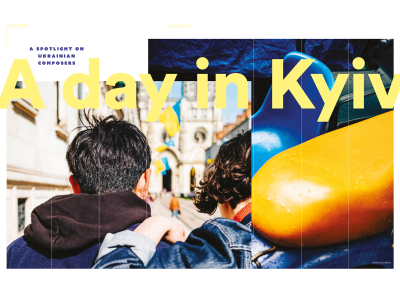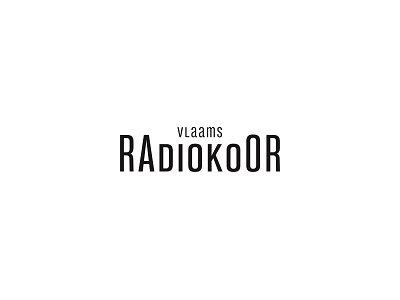Un hommage aux compositeurs ukrainiens d’hier et d’aujourd’hui et à leur riche tradition vocale
Vlaams Radiokoor
L’Ukraine est bien plus qu’une nation en guerre : avec ce programme, nous rendons hommage aux compositeurs ukrainiens d’hier et d’aujourd’hui et à leur riche tradition vocale. Car leur musique – un poing dressé contre l’injustice et la violence – relie les cultures et les conflits à travers le temps.
Le 24 février 2022 se produisait l’impensable : l’invasion de l’Ukraine par la Russie ; une guerre à laquelle personne ne s’attendait et qui choqua le monde entier. Plus d’un an plus tard, la résistance ukrainienne est encore vive : population déchirée, hommes au front, femmes en fuite ; les foyers, le patrimoine et l’histoire ont volé en éclats. Mais la fière Ukraine vit !
La musique témoigne de cette identité culturelle fière et puissante. Dmitri Bortnianski (1751-1825) est l’un des trois compositeurs phares du XVIIIe siècle ukrainien qui choisirent d’intégrer la musique folklorique pour affirmer leur identité culturelle. Mykola Lyssenko (1842-1912) est considéré comme le « père de la musique ukrainienne ». Dans son Hymne à l’Ukraine, il écrit : « Seigneur tout-puissant, protège notre Ukraine bien-aimée, bénis-la de la liberté et de la lumière de tes rayons sacrés. »
Tout au long de l’histoire, cette liberté dut être durement acquise. Lorsque Myroslav Skoryk (1938-2020) écrivit Melody en 1982 (pour un film de guerre russe alors que l’Union soviétique régnait sur le pays, ce qui en fit une œuvre controversée), il ne pouvait imaginer que quarante ans plus tard, l’œuvre deviendrait l’hymne spirituel de l’Ukraine. Le compositeur Valentin Silvestrov (né en 1937) fuit sa patrie bien-aimée en mars 2022. Depuis, de sa douce musique, il continue à protester depuis Berlin contre toutes les horreurs, que ce soit dans son pays ou dans le monde.
C’est en 1937 que le NIR fonde le chœur de chambre professionnel Vlaams Radiokoor (Chœur de la Radio Flamande). Véritable référence en matière de musique vocale en Flandre et en Europe, le Vlaams Radiokoor compte aujourd’hui parmi les chœurs de chambre professionnels les plus réputés de Belgique et d’ailleurs. Les 32 chanteurs répètent sous la direction du directeur musical Bart Van Reyn, dans le Studio 1 du célèbre bâtiment Flagey à Bruxelles. Chef et ensemble sont unis par une passion commune pour le répertoire contemporain, par la conviction que la voix est le meilleur vecteur de nos émotions et par la volonté de rendre notre patrimoine vocal accessible à la fois aux chanteurs et au public.
Oekraïne was en is meer dan een natie in oorlog : met dit programma eren we Oekraïense componisten van vroeger en nu, en laten we de rijke vocale traditie die ze vertegenwoordigen weerklinken. Want hun muziek - een geweldloze vuist tegen onrecht en geweld - verbindt en raakt over tijd, culturen en conflicten heen.
Op 24 februari 2022 gebeurde het ondenkbare : de Russische invasie van Oekraïne, tot dan een doembeeld van kranten en onderhandelingstafels. Een oorlog die niemand verwachtte en de wereld schokte. Meer dan een jaar later ratelt het afweergeschut nog steeds in de Oekraïense steden : de bevolking werd uit elkaar gerukt, mannen naar het front en vrouwen op de vlucht, de veilige thuis, het mooie erfgoed en de rijke geschiedenis aan flarden geschoten. Maar een trots Oekraïne houdt stand.
Die trotse en krachtige culturele identiteit horen we ook in de muziek die er door de eeuwen heen geschreven is. Dmitri Bortnianski (1751-1825) was een van de ‘Gouden Drie’ Oekraïense componisten uit de 18de eeuw, die bewust volksmuziek verwerkten om de eigen culturele identiteit te bevestigen. Mikola Lisenko (1842-1912),‘Vader van de Oekraïense muziek’, schreef in zijn Hymne voor Oekraïne : “Heer, o grote en almachtige, bescherm ons geliefde Oekraïne, Zegen haar met vrijheid en licht van uw heilige stralen.”
Die vrijheid is doorheen de geschiedenis een felbevochten goed. Toen Miroslav Skorik (1938-2020) in 1982 zijn toen omstreden Melody schreef, notabene voor een Russische oorlogsfilm terwijl de Sovjet Unie het land regeerde, kon hij niet vermoeden dat het werk 40 jaar later zou uitgroeien tot de spirituele hymne van Oekraïne. Componist Valentin Silvestrov (1937) ontvluchtte in maart 2022 zijn geliefde vaderland. Sindsdien blijft hij vanuit Berlijn met zijn verstilde muziek mild protesteren tegen alle verschrikkingen - in de wereld in het algemeen, en in zijn land in het bijzonder.
Het Vlaams Radiokoor werd in 1937 als professioneel kamerkoor opgericht door de toenmalige openbare omroep. Vandaag is het koor een referentie voor vocale muziek in Vlaanderen en Europa, en wordt het zowel in binnen- als in buitenland tot de top gerekend. De 32 zangers repeteren onder leiding van muziekdirecteur Bart Van Reyn in Studio 1 van het bekende Flagey-gebouw in Brussel. De gedeelde passie voor hedendaags repertoire, het geloof in de stem als ultieme vertolker van onze emoties, en het streven om ons vocaal erfgoed toegankelijk te maken voor zangers en publiek zijn wat ensemble en dirigent verbindt. Het Vlaams Radiokoor is een instelling van de Vlaamse Gemeenschap.
Ukraine was and is more than a nation at war : with this programme, we honour past and present Ukrainian composers, and let ring the rich vocal tradition they represent. Because their music – a non-violent fist in the face of injustice and violence – connects and reaches across time, cultures and conflicts.
On 24 February 2022, the unthinkable happened : Russia invaded Ukraine. Until then it had just been a doom scenario depicted in newspapers and at negotiating tables. It is a war that no one expected and it has shocked the world. More than a year later, the anti-aircraft gun still rattles in Ukrainian cities : the population is being torn apart, men to the front and women to shelter. The safe home, the beautiful heritage and the rich history has been shot to pieces. But a defiant Ukraine is standing firm.
This proud and powerful cultural identity can also be heard in the music that composers have written over the centuries. Dmitri Bortniansky (1751–1825) was one of the ‘Golden Three’ Ukrainian composers of the 18th century, who deliberately incorporated folk music to confirm his own cultural identity. Mykola Lysenko (1842–1912) is considered the ‘Father of Ukrainian Music’. In his Hymn to Ukraine he wrote : ‘Lord, oh great and almighty, protect us beloved Ukraine, Bless her with freedom and light from your holy rays.’
Throughout history, this freedom has been a fiercely contested good. When Myroslav Skoryk (1938–2020) wrote his then controversial Melody in 1982 – incidentally, for a Russian war film while the Soviet Union ruled the country – he could not have suspected that the work would become the spiritual anthem of Ukraine some 40 years later. Composer Valentin Silvestrov (1937) fled his beloved homeland in March 2022. Since then, he has continued to protest peacefully from Berlin with his gentle music against all the horrors – in the world in general, and in his country in particular.
The Vlaams Radiokoor (Flemish Radio Choir) was founded in 1937 by the Belgian public broadcaster of the day. Today, the Vlaams Radiokoor is renowned for vocal music in Flanders and Europe, and is counted among the top ensembles both at home and abroad. The 32 singers rehearse under the baton of music director Bart Van Reyn in Studio 1 of the well-known Flagey building in Brussels. A shared passion for contemporary repertoire, the belief that the voice is the ultimate interpreter of our emotions, and the commitment to make our vocal heritage accessible to singers and audiences alike are what binds the ensemble together.


